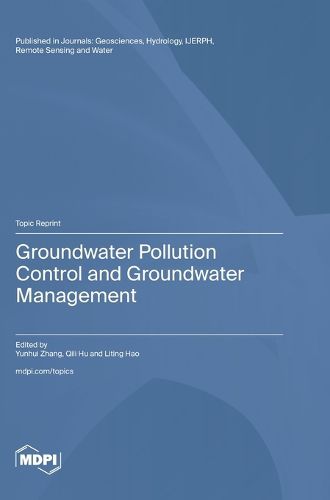Readings Newsletter
Become a Readings Member to make your shopping experience even easier.
Sign in or sign up for free!
You’re not far away from qualifying for FREE standard shipping within Australia
You’ve qualified for FREE standard shipping within Australia
The cart is loading…






This title is printed to order. This book may have been self-published. If so, we cannot guarantee the quality of the content. In the main most books will have gone through the editing process however some may not. We therefore suggest that you be aware of this before ordering this book. If in doubt check either the author or publisher’s details as we are unable to accept any returns unless they are faulty. Please contact us if you have any questions.
Groundwater, a hidden reservoir beneath the Earth's surface, is a vital lifeline for billions around the world, supporting drinking water supplies and industrial and agricultural production. As a core component of the hydrological cycle, it interacts dynamically with ecosystems, soil, and surface water. The increasing demand for freshwater as a result of population growth and climate change has intensified the need to address groundwater vulnerability. Sources of pollution such as agricultural runoff, industrial wastewater, untreated wastewater, and chemical infiltration threaten water quality by introducing heavy metals, nutrients, and pathogens, endangering human health and ecological balance. These risks have a disproportionate influence on marginalized communities, exacerbating socio-economic disparities. Anthropogenic pressures like urbanization and over-extraction further hinder the sustainability of groundwater and therefore necessitate a comprehensive management framework. Mitigation methods require the adoption of practices to reduce pollution in agriculture and industry and the promotion of public participation in management. Interdisciplinary collaboration among researchers, policymakers, and communities is essential to advance remediation strategies and sustainable governance. This Reprint combines case studies, on-site data, and successful intervention measures to elucidate contamination pathways, evaluate management efficacy, and chart conservation roadmaps. Protecting the integrity of groundwater is crucial for granting fair access to resources and combating escalating challenges to the climate and human life.
$9.00 standard shipping within Australia
FREE standard shipping within Australia for orders over $100.00
Express & International shipping calculated at checkout
This title is printed to order. This book may have been self-published. If so, we cannot guarantee the quality of the content. In the main most books will have gone through the editing process however some may not. We therefore suggest that you be aware of this before ordering this book. If in doubt check either the author or publisher’s details as we are unable to accept any returns unless they are faulty. Please contact us if you have any questions.
Groundwater, a hidden reservoir beneath the Earth's surface, is a vital lifeline for billions around the world, supporting drinking water supplies and industrial and agricultural production. As a core component of the hydrological cycle, it interacts dynamically with ecosystems, soil, and surface water. The increasing demand for freshwater as a result of population growth and climate change has intensified the need to address groundwater vulnerability. Sources of pollution such as agricultural runoff, industrial wastewater, untreated wastewater, and chemical infiltration threaten water quality by introducing heavy metals, nutrients, and pathogens, endangering human health and ecological balance. These risks have a disproportionate influence on marginalized communities, exacerbating socio-economic disparities. Anthropogenic pressures like urbanization and over-extraction further hinder the sustainability of groundwater and therefore necessitate a comprehensive management framework. Mitigation methods require the adoption of practices to reduce pollution in agriculture and industry and the promotion of public participation in management. Interdisciplinary collaboration among researchers, policymakers, and communities is essential to advance remediation strategies and sustainable governance. This Reprint combines case studies, on-site data, and successful intervention measures to elucidate contamination pathways, evaluate management efficacy, and chart conservation roadmaps. Protecting the integrity of groundwater is crucial for granting fair access to resources and combating escalating challenges to the climate and human life.